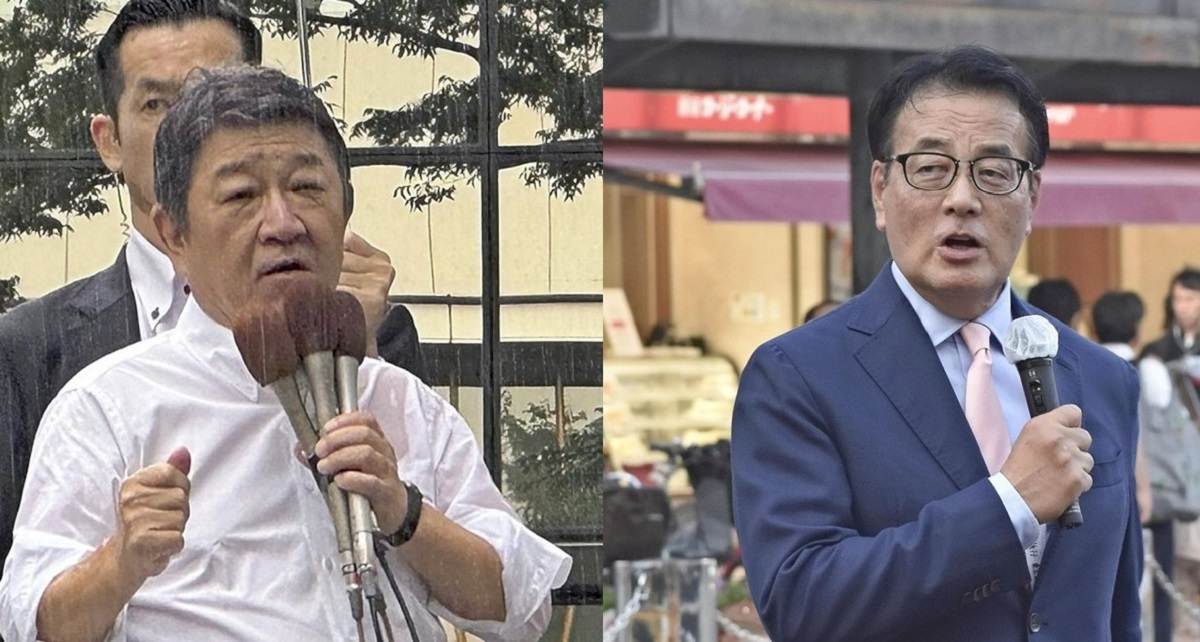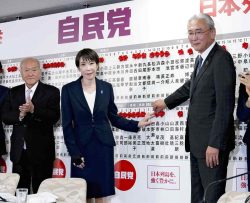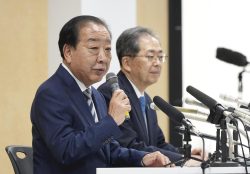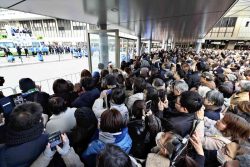Tokyo Assembly By-elections Enter Final Stage Of Campaigning; Sunday Vote Is Expected To Prefigure Lower House Election Outcome

Left: Liberal Democratic Party Secretary General Toshimitsu Motegi addresses people on the street in Fuchu, Tokyo, on Thursday. Right: Constitutional Democratic Party of Japan Secretary General Katsuya Okada gives a speech to support a candidate in Adachi Ward, Tokyo, on Thursday.
6:00 JST, July 6, 2024
The ruling and opposition parties are throwing all their energy into the final phase of campaigning for the Tokyo metropolitan assembly by-elections, which will be held Sunday.
Most of the nine constituencies to be contested are straightforward competitions between the ruling and opposition parties, whose results will likely be predictive of the outcome of the next House of Representatives election.
“Our party is facing severe criticism,.” said Liberal Democratic Party Secretary General Toshimitsu Motegi as he took the microphone in front of a station in Fuchu, Tokyo, on Thursday. “We’re committed to continuing political reforms without causing any more problems,” he added, emphasizing his attitude of humility in the wake of a series of politics and money scandals caused by factions within the LDP.
As the by-election campaigns enter their final stage, LDP executives and ministers have been seen visiting campaign sites actively to support candidates they endorse. Motegi was also in Kita Ward to support another candidate on that day and will appear in Nakano Ward on Saturday.
The whole of the LDP is getting involved in the battle, with even high-profile lawmakers, such as Economic Security Minister Sanae Takaichi, Digital Transformation Minister Taro Kono and former LDP Secretary General Shigeru Ishiba, being sent to campaign.
The LDP have fielded candidates in eight constituencies this time; six of those elections will be ruling-opposition confrontations. The LDP will consider it a victory if they win four or more of these races.
The LDP has focused on the by-elections because they will “reflect the party’s strength better than the Tokyo gubernatorial election, for which the voting and counting will be held that same day,” a senior LDP official said.
At the same time, the LDP faces a dilemma: strengthening its support for its by-election candidates would only highlight their connection to the party at a time when it is facing significant headwinds, ultimately working to its disadvantage.
In Tokyo’s Hachioji — the home turf of former LDP Policy Research Council Chairperson Koichi Hagiuda, who came under criticism for the Abe faction’s violation of the Political Funds Control Law — LDP Election Strategy Committee Chairperson Yuko Obuchi attended a rally in mid-June, but the event was held behind closed doors.
A source in the camp of an LDP-backed candidate said, “Our priority this time is to solidify our support from our base rather than from swing voters.”
The Constitutional Democratic Party of Japan and the Japanese Communist Party, which team up for the Tokyo gubernatorial election, are eager to capture anti-LDP votes by not fielding their own candidates in each other’s constituencies but sharing spots at seven constituencies in the by-elections.
Unlike the LDP, the CDPJ and the JCP are campaigning for the by-elections in tandem with the gubernatorial race, with CDPJ Secretary General Katsuya Okada saying Thursday in Adachi Ward, “There are two important elections on Sunday: the Tokyo gubernatorial election and the Tokyo assembly by-elections.”
JCP secretariat head Akira Koike said Thursday on the streets of Kita Ward, “The government in Tokyo can be changed if the governor is replaced and the number of assembly members of the [new] governor’s ruling party is increased.” Koike said the name of a certain gubernatorial candidate and former CDPJ member 15 times and called for support.
The Japan Innovation Party fielded candidates in two constituencies to face off against the JCP-backed candidates in a fight for anti-LDP votes.
Top Articles in Politics
-

Japan PM Takaichi’s Cabinet Resigns en Masse
-

Sanae Takaichi Elected Prime Minister of Japan; Keeps All Cabinet Appointees from Previous Term
-

Japan’s Govt to Submit Road Map for Growth Strategy in March, PM Takaichi to Announce in Upcoming Policy Speech
-

LDP Wins Historic Landslide Victory
-

LDP Wins Landslide Victory, Secures Single-party Majority; Ruling Coalition with JIP Poised to Secure Over 300 seats (UPDATE 1)
JN ACCESS RANKING
-

Japan PM Takaichi’s Cabinet Resigns en Masse
-

Japan Institute to Use Domestic Commercial Optical Lattice Clock to Set Japan Standard Time
-

Israeli Ambassador to Japan Speaks about Japan’s Role in the Reconstruction of Gaza
-

Man Infected with Measles Reportedly Dined at Restaurant in Tokyo Station
-

Videos Plagiarized, Reposted with False Subtitles Claiming ‘Ryukyu Belongs to China’; Anti-China False Information Also Posted in Japan























